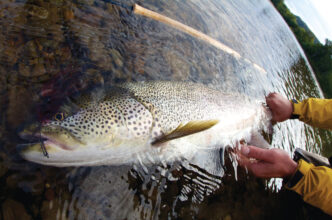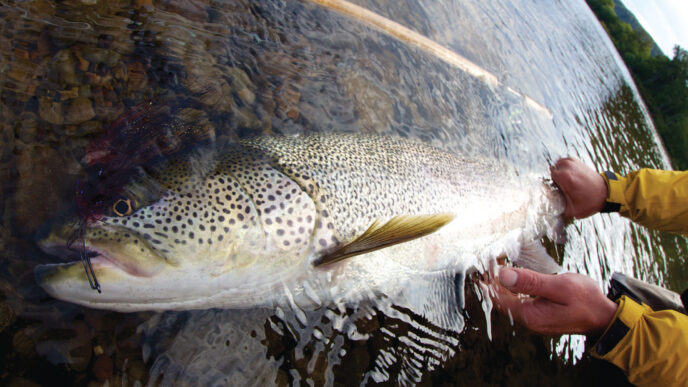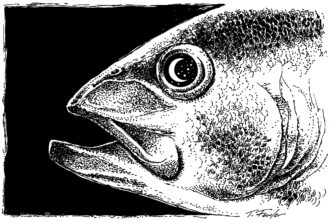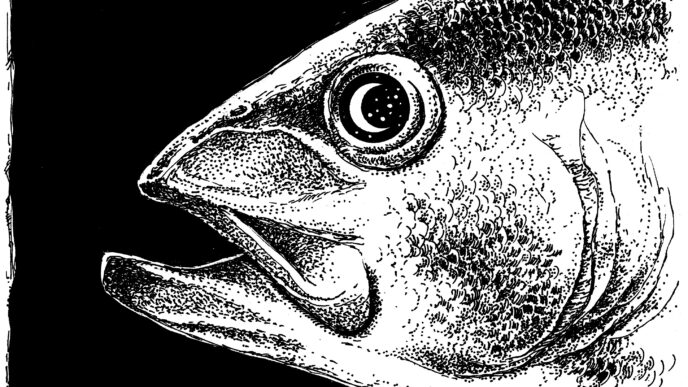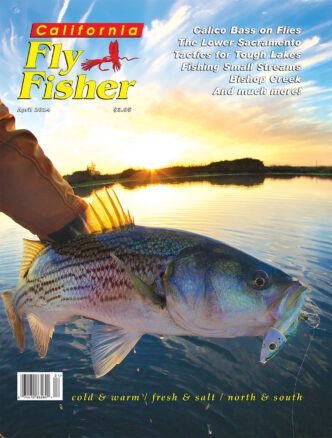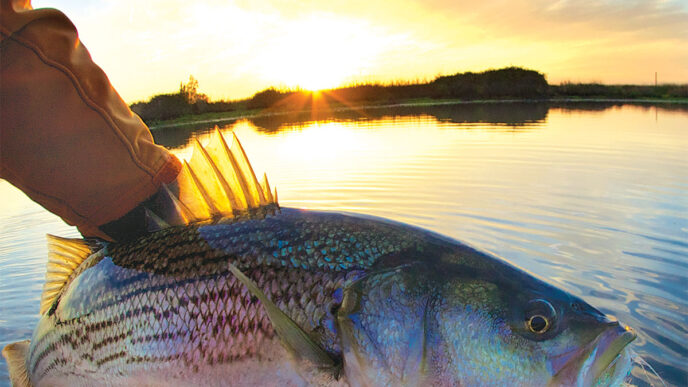If you’ve read this magazine for any time at all, you’ve read the work of Michael Checchio — feature articles that combine a straightforward literary style with a deep sense of the value of the natural world, and the sort of insightful book reviews that only a writer can write. Maybe you’ve also read his work in other angling magazines, such as Gray’s Sporting Journal, Fly Rod & Reel, Trout, and Flyfisher, or one of his books — A Clean, WellLighted Stream, Mist on the River, or Sundown Legends, for example. But unless you happen to have read his Being, Nothingness, and Fly Fishing: How One Man Gave Up Everything to Fish the Fabled Waters of the West, you probably don’t know that Checchio comes to writing about angling and the natural world in the West by an unusual route: he started out as a crime reporter in Atlantic City, New Jersey, covering the Mafia.
Bud: How does someone go from being a crime reporter in South Jersey to being an angling writer in San Francisco?
Michael: I never thought there was anything counterintuitive about covering a mob murder at midweek and then going fly fishing on the weekend. Although I realize that’s not exactly how Ernest Schwiebert got his start.
I remember once I was in West Yellowstone on the first day of my annual fishing vacation. And I learned that Salvatore Testa, a capo in the Philly mob, had just been discovered lying face down in a ditch in Gloucester Township, New Jersey, hog-tied and with a bullet in the back of his head. Now this was way before cell phones. So there I was in my waders, standing on the sidewalk in West Yellowstone, Montana, my fly rod leaning up against the wall, talking on a payphone about a Mafia hit and trading theories about the murder with a colleague back in New Jersey. And I might add that I got a very dodgy look from a passerby who must have heard a snatch of my conversation. It’s not the kind of chatter you normally overhear in West Yellowstone. Maybe I should have thrown in something about the morning hatch on the Madison, just to divert suspicion. But to me, it was just another mob murder, one in about two dozen that I covered. And frankly, I was anxious to get back to the fishing. After all, I know my priorities.
I was working back then as an investigative reporter for a midsized daily newspaper in Atlantic City. My job was to cover political corruption and, after the passage of the casino gambling referendum in New Jersey, the rise and fall of a
Mafia family and their attempts to control the rackets in Atlantic City. This was an invitation to a stupefying banquet of mob rubouts and political shenanigans.
I never found anything incongruous in the juxtaposition between fishing and what I did for a living. It’s true that Atlantic City was, and still is, a seaside slum. We don’t associate casinos with the Great Outdoors. But South Jersey also has the Atlantic flyway, rich marshlands, woodcock coverts, and barrier islands — a sportsman’s paradise. The Pine Barrens are for more than just dumping bodies in. Read John McPhee. It’s hard to believe, but there once was a lot of natural beauty and mystery in South Jersey. That was until a runaway development boom buried it under the debris of what passes for our civilization.
So I would write about murder and graft, take a few days off to recharge my batteries by writing a poetic feature about the cranberry harvest in the pinelands, and then go back to writing stories about mobsters winding up as candidates for long-term parking at Philadelphia International Airport.
In retrospect, I can see it was a bit unusual to be good at both features writing and investigative reporting. Most investigative reporters are pedestrian prose stylists. But my background was as an English major, and I always had a passion for literature. I noticed while I was at my newspaper that roughly half the reporters had backgrounds as English majors like me and the other half were journalism-school graduates. And I was quick to pick up on the fact that the English majors were just as good as the J-school grads when it came to hard news, but were much better writers. We also had a more rounded view of the culture, which comes from being better read. That’s all changed now. Today, the majority of journalists are J-school grads. And all the would-be English majors have switched to creative writing programs, because postmodernist college professors took over the English departments and drove away anyone with a love of literature. So I think I got the best of it back in my day.
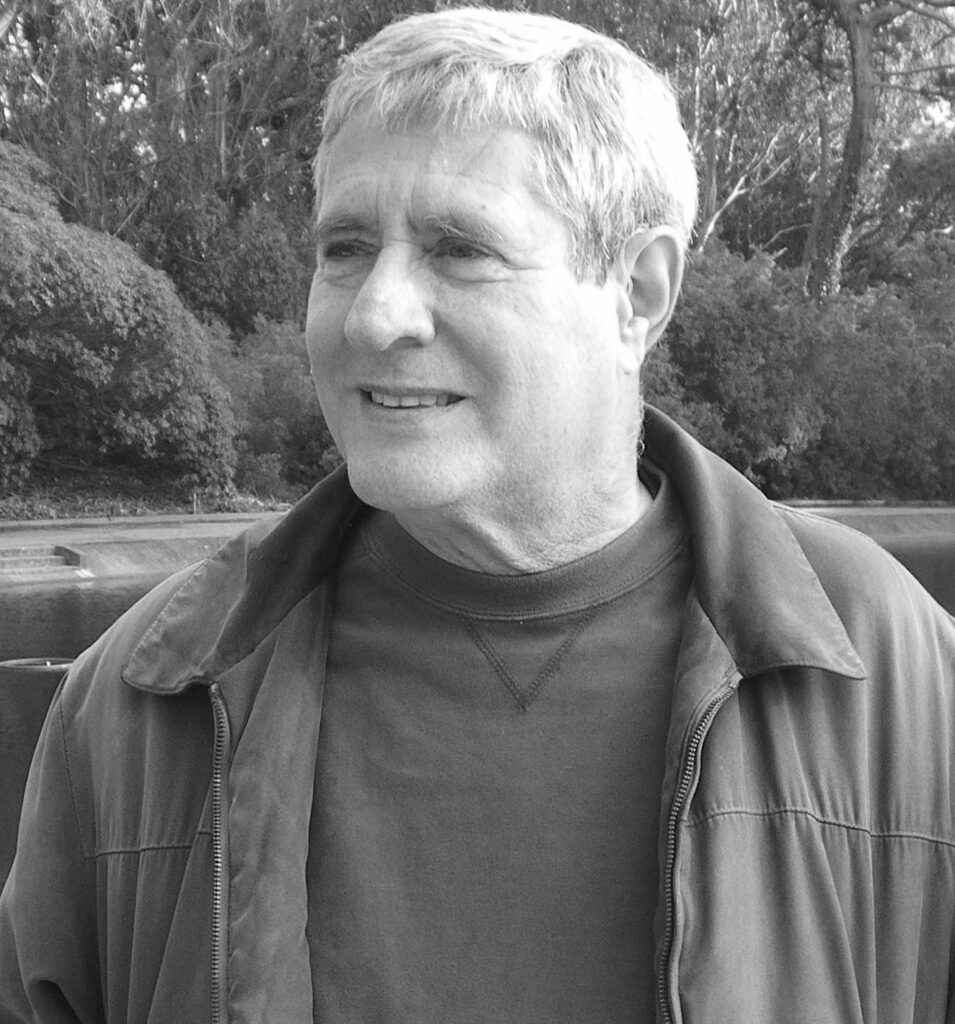
Bud: Back up a bit, how did you become a reporter in Atlantic City?
Michael: The truth is, I had never given a thought to being a reporter. I was a student attending Richard Stockton State College, which had just opened in Pomona, near where I lived, and had grown up in South Jersey. I had transferred there from LaSalle College in Philadelphia and, as I said, I was an English and literature major. I didn’t even read the newspaper. I figured — if I even bothered to think about my future at all — that one day I might become a published poet and teach literature at a college. Then one day I got a call from my history professor, Bill Daley, who was impressed by a paper I had written for his class. And he told me there was a reporting internship available at The Press, Atlantic City’s daily newspaper, and had I ever given any consideration to a career in journalism? Naturally, I lied and said yes.
I told a few more lies and got the gig. Now get this. It was a paid internship. I got paid to learn how to write. I learned more in a week at that newspaper than what they probably teach you in a semester at the Iowa Writers’ Workshop — but instead of finding myself fifty thousand dollars in hock on student loans, as you would today, I got a paycheck. It wasn’t much, but back in those days, you could live on a reporter’s salary. I was having a ball, and I soon lost all interest in my classes. So I spent every free moment I had at that newspaper. And in a breathtakingly short time, I went from writing obituaries and interviewing Santa at the mall to being a full-time reporter, covering police corruption, the courts, and homicides. Before I knew it, I was the newspaper’s principal investigative reporter, and I was sniffing out crooked political deals and doing a run-down on elected officials who weren’t exactly model citizens. But I always made sure to get in plenty of fishing on my days off.
Bud: What is it about crime reporters who turn into angling writers — not just Seth Norman, but you?
Michael:I don’t know that there’s anything about them. I only know of three in total, but there might be more. I know of me, Seth, and Fen Montaigne, who wrote Reeling in Russia. Fen and I were friends and rivals covering the mob and political corruption in Atlantic City. Fen was the former Moscow bureau chief for the Philadelphia Inquirer, and at the time I made his acquaintance, he was in charge of his newspaper’s Atlantic City bureau. The Philadelphia Inquirer isn’t much today, but back then, it was one of the best daily newspapers in America. It used to win armloads of Pulitzers under the brilliant stewardship of its editor, Gene Roberts. Fen and I were competing to break stories about how the mob was funneling money into the mayor’s campaigns and how the mayor was supposed to have a hidden interest in a casino project that was to be built on city-owned land. And all the while, as we were competing on these stories and trying to scoop the hell out of each other, Fen and I might be hunting woodcock together on the weekend.
Fen later became the Inky’s outdoors columnist, and not long after that, he was named a runner-up for the Pulitzer Prize in features writing for his marvelous columns. Fen went on to write Reeling in Russia, an account of his fishing adventures in post-Soviet Russia, and later he became a writer for National Geographic. I’m proud to say that my newspaper more often than not led the Inquirer on those Mafia and corruption stories. We had decided that this was our story, and nobody was going to beat us. It’s as true in reporting as it is in fishing — nothing beats local knowledge.
Bud: Given what you say about Atlantic City, I’d think there would be a career’s worth of material available there. Why did you give it all up to move to the West Coast?
Michael: Frankly, the mob prosecutions and federal corruption trials were becoming repetitive to a fault. I had been privileged to watch and report on the rise and fall of a Mafia family, but I knew that after the last racketeering trial wrapped up, and the last wiseguy went off to prison, there would never again be anything as interesting for me to report on if I stayed in Atlantic City. I had already been there for 15 years, and this was the high point. So when it concluded, I left.
Also, I was sick to death of the Eastern seaboard. The northeastern United States is an unbroken urban corridor from Boston down to Norfolk, Virginia. Try finding any room for your back cast. If you want to see nature raped, come to New Jersey. Calling it the Garden State is the
punch line of a joke. Even the southern part of the state, which once was quite beautiful and interesting to look at, had really succumbed to a mad push for development. And I’ve never seen a place with more litter. It was everywhere. I would drive down the most remote sand roads in the Pine Barrens and find heaps of trash. Now why did somebody drive all the way out there just to throw away a condom? Somebody should ask Governor Chris Christie what kind of animals live in his state. Is it worth putting up with this for a few Bruce Springsteen tunes?
So I moved out West, where you see a little more respect for the natural world than you find in New Jersey. I had been to the Rocky Mountains many times on my vacations, fly fishing in places such as Jackson Hole and Yellowstone Park. And then one year I had a chance to sample the steelhead fishing on the West Coast, and that clinched the deal. I knew that I had professional skills that I could transfer to any place in the country.
And there’s a final reason I packed up and moved. I wanted to become a better writer, and writing about the Mafia for a newspaper wasn’t going to do it for me. Eventually, everybody who covers the mob begins writing in a wiseguy style that is a cliché. It’s an occupational hazard. And newspaper writing in general wasn’t going to satisfy me. You learn how to write tight and fast at a newspaper, but that’s about all. The form is way too restrictive and too dependent on formulaic writing. I wanted to write something that might have lasting value, something people might like to read a hundred years from now because it was beautiful, and that meant writing books. I was crazy about fishing, and totally in love with nature and the outdoors. So why not make that my subject?
Bud: I hear that you’re a self-taught fly fisher. How did that come about, and what are the pluses and minuses of coming to the sport in that way?
Michael: It’s probably all minuses. Because I’m self-taught, you can see thirty year’s worth of bad habits built into my casting stroke. I’m like a violinist who tries to play by inspiration without first learning any technique. Now there’s a concert you might want to avoid.
And it’s all my fault that it turned out this way. You see, back when I first started at my newspaper, there was a fellow there named Jim Merritt who was a fly fisherman. Jim was a superb features writer and editor. But he left the newspaper before I developed an interest in fly fishing. if I had
acted sooner, I could have had a great teacher. Jim went on to take a job as a public information officer at Princeton, his alma mater, where he had access to that university’s great collection of fly-fishing literature. Jim builds his own fly rods, has written books on many subjects, and is a fishing buddy of John McPhee. ( Jim is referred to in McPhee’s The Founding Fish.) So I’m kicking myself in the ass for blowing a great opportunity to learn from a master.
When I finally did become interested in fly fishing, there simply wasn’t anyone else I knew who fly fished. Paul Merkoski, who would go on to become the editor of my newspaper, had fly fished as a boy, and he showed me how to perform a simple overhand cast in the parking lot. And that two-minute session was the only instruction I’ve ever had.
So I learned on my own. I basically taught myself all the necessary casts and how to work the fly in moving water. And I learned how to read a trout river through observation, trial and error, by asking lots of questions when I got to the riverbank, and by reading lots of books, although frankly, they were a bit confusing. Don’t even ask how I managed to survive my first attempt at fly fishing in the Atlantic Ocean. That was quite a workout. In order to get in any trout fishing at all, I had to drive very long distances. There are no trout rivers in South Jersey — the water is just too warm and acidic. So I would have to make a tortuous drive to the northwestern part of the state to fish mountain rivers such as the South Branch of the Raritan or the Big Flatbrook. I soon learned that there was better trout fishing in the Poconos of Pennsylvania or in the limestone country around Carlisle. A long drive indeed. But it’s all doable. What was it Yeats said? “The fascination of what’s difficult.”
Bud: From your perspective, are there any notable differences between fishing in the East and West?
Michael: All the flow is westward, isn’t it? That’s got to tell you something.
Bud: You’ve been doing this a long time. What are the biggest changes you’ve seen in fly fishing over the years?
Michael: The price of everything. I took up fly fishing in 1978. In May of that year, an essay by Russell Chatham appeared in Outside magazine that was called “Why the Kid Went Fishing: An Inventory of Motives.” It was a personal essay, and it was accompanied by a short sidebar, also written by Chatham, that was headlined
“Getting Started for $100 (Give or Take Thirty-Six Cents).” Chatham showed how you could get a serviceable fly rod, reel, and double-taper fly line, along with a spinning rod-and-reel combo, chest-high waders, a handful of flies and Mepps lures, a leader, and other assorted knickknacks, all for just a hundred dollars and thirty-six cents. There was even a photograph of all the swag with the price tags to prove it. Today, that hundred might buy you a fly line. I don’t know what you can do with the thirty-six cents.
I suppose the mystique of fly fishing has always been marketed. But these days, it seems slicker than ever. When I began fishing, guides were cool. Now there are just too many of them. It’s nobody’s fault. It’s certainly not the guides’ fault. It’s just the way it is. There’s always been an uneasy alliance between art and commerce. As William Blake said, “When nations grow old, the arts grow cold / And commerce settles on every tree.” And I might add trumps all. But so what? None of us have any control over the times we’re born into and the vulgarity that surrounds us. So I don’t worry about it. I find the best approach to the absurdity is to ignore it or laugh it off. There are things in this life you can control and things you can’t control. And only until you realize that and act on it will you ever be able to achieve any kind of inner tranquility and outward effectiveness. That’s what the philosopher Epictetus taught. And that’s what I keep telling myself each time a guide rows his McKenzie driftboat over my line when I’m trying to fish for steelhead.
Bud: Although you are self-taught and, as you said, hardly an expert angler, yet you make fly fishing your subject for writing. What is it like trying to find your own literary voice among all your illustrious predecessors?
Michael:I feel like the most nonauthoritative fishing writer in print. I write in the personal-essay style. So for me, writing about angling is not just writing about fishing, which I love, but also it’s an opportunity to write about nature and sometimes take a slightly off-kilter view of the world I live in. So I have all these subjects to write about in a fishing story. And I think I can write about them evocatively. I’ve published four nonfiction books about fly fishing, nature, and the outdoors. And I’ve recently completed two mystery novels where nature takes center stage — my agent is currently endeavoring to sell them to a publisher. We’ll see how that goes.
Bud: One of the contributions you’ve made to this magazine, via reviews and feature articles, is to draw attention to the writing of poets and writers of past generations, especially the Beat Generation — writing that has some kind of association with fly fishing in the West, from the practical to the metaphysical, not that these are necessarily opposed to each other. Why do we need to return to these writers, and what can we learn from them, as citizens and anglers?
Michael: Please don’t ask me about citizenship. I feel like I’m being called to jury duty.I do this only because it gives me pleasure. I write about the things that interest and delight me. And if they interest and delight readers, they wind up in print. For example, there were a few poets I admired who happened to be handy with a fly rod, so I wrote about them. I like poetry and fishing, so I combined those two subjects, and it seemed to work. Most of the time, I write about rivers and landscapes that inspire me and what it feels like to soak up that inspiration and feel it reflected all around you. When I review books from the past, it’s because I want to share my enthusiasm for them. When I write about the historical past, it’s not only because it fascinates me, but because it’s part of the present. As Faulkner said, the past isn’t past. It’s a continuum. I would think that most fly anglers like to know they are part of a rich historical tradition. But I could be wrong about that. For all I know, they think “the past” is the Brad Pitt movie. But that wouldn’t upset me, only amuse me.
The personal-essay form gives you the freedom to write about all this stuff. California Fly Fisher is one of the rare fishing magazines where you can get away with this sort of thing. Frankly, there’s not much of a market for the personal essay in fishing magazines, or even in books anymore. So I don’t recommend it if you’re looking to get rich.
I like to leaven my writing with humor. I like wit and irreverence. The writers I really get a kick out of — Mark Twain, Edward Abbey, Jim Harrison — are all pretty funny guys. They write about what’s numinous, but they never make you feel like you’re in church. I like Barry Lopez. He’s awfully good. But would it kill him to tell a joke?
Getting that balance is the hardest thing. Keeping the momentum going is also important. I like to read a lot of quality crime fiction, and one thing you’re always encountering in that genre is a great deal of smart social commentary and cultural observation — not essential to the plot per se, but a good part of the fun. Well, you can do a little bit of that in a fishing story, as long as you don’t neglect the plot, which is the fishing. So fishing always comes first.
Bud: All writers suffer rejection, from magazine and press editors to hostile reviewers, and I’ve read a couple of reviews of your work that were less than welcoming. How do you handle that?
Michael: I’ve been threatened by experts. Do you think I give a crap about a bad review in a literary journal? Once I reported that there was a contract taken out on the life of Atlantic City mob boss Nicky Scarfo. I said that it was taken out by the Commonwealth of Pennsylvania, which was looking to execute him for his crimes. “Nicky’s mad at you,” Bobby Simone told me. Bobby was Nicky’s mouthpiece and a Philadelphia mob lawyer par excellence. Now that’s a bad review.
Bud: If I said “let’s go fishing tomorrow,” where would you go? That is, where do you go when you’ve just got to fish? And if the world was going to end a year from now and you had unlimited resources, where would you fish?
Michael: The North Umpqua in Oregon. I’d go there if the world was going to end in the next twelve months. And I’d go there if the world was going to remain intact. The Umpqua is like fishing in the world’s most beautiful painting.
As for the world coming to an end, don’t worry about it. I’m always telling people that we’re not hurting the planet. The planet is just fine. What we’re destroying is our habitat. We are altering the climatic conditions in which the human species evolved and flourished. But don’t worry about the planet. It’s survived worse than a carbon overload. And it’s certainly survived far worse than Homo sapiens. I suspect the planet has plans for us along the same lines as the dodo bird.
If I might be permitted a diatribe, the prognosis for our survival as a robust species is not good. I’ve spent a lot of time and energy raising money for various environmental causes, and I’ve learned two things from this. Environmental groups are focused too much on fund-raising, and any victory is just a stay of execution.
The corruption and pettifoggery that I witnessed as a reporter in Atlantic City pales in comparison with our crimes against the natural world. One of the things I’ve learned is that the biggest crimes aren’t even crimes. The moment a bribe becomes too large to fit comfortably under the table, we legalize it and call it a campaign contribution. But even if this corruption didn’t exist — even if all corporations on earth embraced altruism, rather than evil and the bottom line — the end result would probably still be the same. There are just too many people. And it’s nobody’s fault. It’s just humans doing what comes naturally. And that’s nature.
I might be wrong about this. We might find a way to wiggle out of it. After all, we’re awfully clever with our hands. (It must be those opposable thumbs, so handy for tying flies.) If we do, I imagine we’re not going to like the trade-offs.
But James Lovelock, the fellow who came up with the Gaia Theory, which states that the earth is self-regulating, and which I believe to be true, has pointed out that the plague probably won’t be cured by the people who are causing it. My favorite contemporary philosopher, John Gray, who wrote Straw Dogs and The Silence of Animals, has suggested that the most extreme example of human arrogance might be the assumption that we can save our planet from environmental destruction.
Does this mean we should roll over and play dead when some energy consortium wants to frack in Yellowstone National Park? Hell no! I say fight them with everything we’ve got. And bring the bastards to their knees. But only because it’s a matter of character and style.
Bud: And here we are at the obligatory Silly Tree Question. If you were a tree, what kind of tree would you be?
Michael: A lofty Douglas fir shading Surveyor Pool on the North Umpqua. Or perhaps a plastic Christmas tree that shortcircuits and burns down the apartment.







